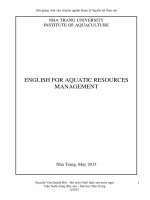unit 11 Bài giảng Anh văn chuyên ngành Tài chính Thư Viện Tài Liệu Tổng Hợp Com UNIT 11
Bạn đang xem bản rút gọn của tài liệu. Xem và tải ngay bản đầy đủ của tài liệu tại đây (263.16 KB, 7 trang )
11 Asset management
AIMS:
To learn about: asset and fund management; key vocabulary of asset management
and allocation
To learn how to: disagree diplomatically
To practise: talking to a client about their investment portfolio
Lead in
o If you had a large amount of money to invest, would you invest it yourself, or get a
professional investment consultant to do it?
o Would you like to invest and manage other people's money?
o What are the different basic strategies of asset management?
Reading 1: Asset management and allocation
1. Paula Foley is an investment consultant in New York. Read her presentation about asset
management. Which three of the following things does she not mention?
allocation
derivatives
liabilities
portfolios
size
diversification
interest
objectives
risk
style
Asset management nowadays means managing financial assets - excluding real estate, works of
art, and things like that. Individual portfolios and institutional funds are very different, because of
size and objectives. There are many classes of possible investments in this area: bonds, stocks, cash,
precious metals, funds and so on. Each of these classes contains a certain number, and sometimes a
very large number, of sub-classes, like categories of bonds or international stocks of various
countries.
The problems for managing assets in this area concern, first of all, the objectives of the portfolio,
of the client, and its size. The objectives of a private portfolio will depend on whether you invest for
retirement or for use in the next few years, for instance to buy real estate. Another major factor is
size, because you can easily diversify and then steer a large portfolio, and it is sometimes much more
expensive to do so for a small one. This problem of objectives and portfolio diversification has a
Unit 11: Asset management
86
direct impact on the returns which are needed or expected to meet these objectives and the implied
risk of these portfolios, a risk which depends largely on the returns that are expected.
In practice, the two major questions which arise are first, defining a strategy, and second, an
investment style. The strategy in fact means asset allocation. You need to decide what proportion of
the funds you will invest in those various classes: bonds, stocks and so on. The asset allocation is the
key to the performance of the portfolio, whether it is between industries, between countries, or
anything else. It is also the heart of the implementation of a reasonable diversification. But mind
you, diversification can be overdone, and then it becomes a very expensive and unproductive
exercise.
2. Read the statements below, which summarize what Paula Foley presents, and then read
again. In what order does she present these things?
a. Asset allocation means deciding how much to invest in different classes of investments:
bonds, stocks and so on.
b. Asset management involves investing in bonds, stocks, cash, precious metals and funds.
c. How you manage assets depends on the client's objectives and the portfolio's size.
d. If you diversify too much it becomes too expensive.
e. It's easier to diversify a large portfolio than a small one.
f. Objectives can be either long term or short term.
g. The risk of a portfolio depends largely on the expected returns
Reading 2: Investment styles
1. Paula Foley presents about investment styles. How many styles does she mention?
The second point is style, which is very often not recognized by investors. There are a number of
styles of investment management, the main ones being first of all, growth investment, which, as the
word says, is looking for growth - for capital accumulation - and looks for growth companies in
growth industries. The second is value, which is the opposite of growth, which is conservative
industries with high asset values and stable or low-growing earnings.
The third main style is the choice between large and small companies, on the equity side. Large
companies are supposed to be stable and more reliable; small companies very often give a faster rate
of growth, but are more difficult to track and manage.
Another point here is when you have invested your funds, you still have to manage your
portfolio, which may take up to a year to build up. There are essentially two ways to manage a
Unit 11: Asset management
87
portfolio. One is active management, where you buy and sell quite frequently, to adapt your portfolio
to your objectives, and to changing market circumstances. The other one is passive investment: you
buy and hold, which used to be for many years, sitting on your positions, until things fundamentally
changed or bonds came to maturity. This has now been developed into index-linked portfolios,
which try to follow stock market or bond market indices, and replicate their movements. This can be
a very attractive proposition, or not, considering that these portfolios go down with the market in
negative times.
2. Use a word from each box to make common word combinations. One word can be used
twice.
asset
accumulation
capital
earnings
conservative
industries
growth
investment
investment
management
stable
values
Reading 3: Fund management
Unit 11: Asset management
88
1. The article below, from The Economist, was published in 2002 after actively managed
equity funds in Britain had lost over 30% [on average] in 30 months. This was only 1%less
than passive, index-linked funds. Read the article, and answer the questions below it.
Fund management: Mug's game
Anger is growing with those who manage money, particularly with those poorly performing
active managers who claimed that it was precisely during tough times that they would come into
their own against indexed funds. In Britain, two-thirds of active managers underperformed the index
last year, even before the fees that they charged are subtracted. Those people are handsomely
rewarded for losing money. Each year they pocket 1-2%of the assets they manage, on top of initial
charges of as much as 5%.Indexers, by contrast, charge only 05% a year, with no upfront fees.
An average fund manager will beat the market some of the time. Over the long run, though, the
great majority of fund managers will do no better than the market average, particularly once their
charges are taken into account. The chances are slim of finding one of those blessed few who can
show real, sustained skill in stock-picking. Even if you find one, you may discover that what made
him good in one economic period will serve him less well in the next.
Believers in the so-called efficient-market hypothesis, developed by American economists in the
1960s, have tried to demonstrate the impossibility of consistent outperformance. They argue that all
useful information that is available to market participants is already factored into a company's share
price. Additional analysis of a share by, for instance, taking a closer look at a company's books or
talking to its management - as well as all attempts at discovering patterns in price movements - will
be futile. This theory opened the door to those offering merely to track the index. Index-tracking
grew hugely during the bull market of the 1980s and 1990s.In the bear market of the past two years,
people have not pulled out much money from index funds - or at least, not yet.
Not everybody buys the efficient-market hypothesis, however. George Soros, a well-known
speculator, thinks he made his money because markets often over- or undervalue things. He also
challenges the view that share prices are simply a passive reflection of underlying value, or of the
expected earnings of a company. A high share price might, for example, trigger certain actions: a
public offering of a company's shares, or a merger or an acquisition. A low share price, meanwhile,
might stop plans for an initial public offering or a merger. This is what Soros calls the market's
'reflexivity'. If knowledge of such a two-way relationship between share prices and assets can be put
to good use, a fund manager might consistently do better than the market.
Peter Lynch, formerly of Fidelity Investments, showed that a more old-fashioned technique looking for good companies that the market fails for a time to appreciate - can also outperform. Yet a
Unit 11: Asset management
89
few examples among a cast of many thousands of fund managers offer only small consolation to the
average investor, who will almost always be better off - or these days, rather worse off-putting his
money in an index fund.
1. Why are people getting angry with active money managers?
2. Why did indexed funds develop?
3. What is the efficient-market hypothesis? Why does it suggest that it is impossible to beat the
market?
4. What is George Soros's argument against the efficient-market hypothesis?
5. How did Peter Lynch beat the market?
6. Why does the article recommend that the average investor should use a passive index-linked
fund rather than an actively managed one?
Discussion
Do you agree with the people who say that it is impossible to beat the stock market, on average?
Unit 11: Asset management
90
New words:
− exclude (v)
: trừ ra, ngoại trừ
− real estate (n)
: bất động sản
− objective (n)
: mục tiêu
− sub-class (n)
: loại phụ
− steer (v)
: hướng theo
− arise (v)
: phát sinh, xảy ra
− define (v)
: xác định, định nghĩa
− strategy (n)
: chiến lược
− overdo (v)
: làm quá mức
− unproductive (adj)
: không hữu ích, không phong phú
− accumulation (n)
: sự tích lũy
− conservative (adj)
: bảo thủ , thận trọng
− track (v)
: theo dõi
− take up to
: choán, chiếm
− adapt (v)
: thích nghi
− fundamentally (adv)
: về cơ bản
− indices (n) = indexes
: chỉ số so sánh
− replicate (v)
: tái tạo, là bản sao của
− proposition (n)
: vấn đề, nhiệm vụ
− underperformed
: hoạt động kém hiệu quả, không sinh lãi
− subtract (v)
: trừ
− reward (v)
: thưởng
− pocket (v)
: giữ lấy, cam chịu
− indexer (n)
: người lập mục lục
− by contrast
: trái ngược
− upfront
: ứng trước
− beat (v)
: đánh bại
− slim
: sơ sài, không như mong đợi
− bless (v)
: may mắn, hạnh phúc
− sustain (v)
: chấp nhận, xác nhận, chịu đựng
− stock-picking
: việc chọn lựa cổ phiếu
− so-called
: được gọi là
Unit 11: Asset management
91
− hypothesis
: giả thuyết
− consistent (adj)
: kiên định
− outperformance (n)
: hoạt động tốt hơn
− factor (v)
: là yếu tố
− futile (adj)
: vô ích , phù phiếm
− merely (adv)
: đơn thuần
− index-tracking
: theo dõi, phân tích chỉ số
− bull market
: thị trường đầu cơ giá lên
− bear market
: thị trường (chứng khoán) hạ giá
− trigger
: gây ra
− meanwhile
: đồng thời
− reflexivity (n)
: tính phản thân
− formerly (adv)
: trước đây
− cast
: sự thử làm
− consolation (n)
: sự an ủi, sự giải khây
Unit 11: Asset management
92









